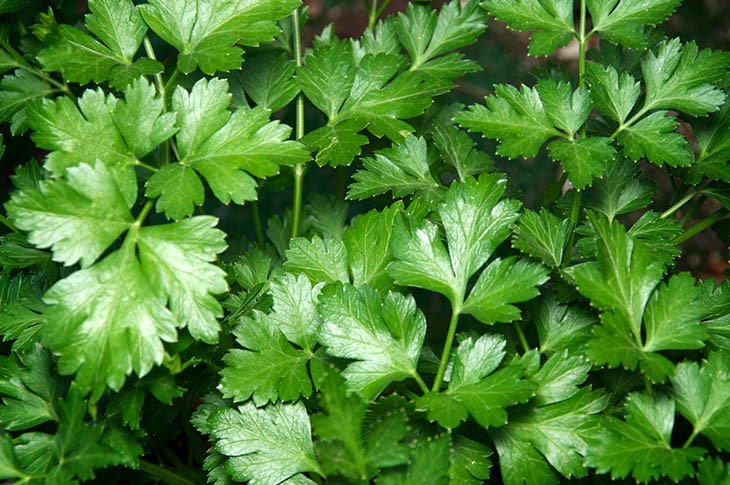Health Benefits of Parsley a Nutritional Powerhouse for Body

We hardly ever think of Parsley as a food because it’s so small and light. However, this herb can be very healthy for you. In this Well-being article, I did like to share some of the health benefits of parsely so that you see why it’s necessary to include it in your food often. I will also share some tips on how to use parsely it and add it to your dishes.
Parsely has various health benefits that you should be aware of: it is extremely rich in vitamin C, topping most fruits and vegetables in concentration of this vitamin that can inhibit colds, fight infection, help to heal wounds, and serves as a powerful antioxidant.
Due to it being rich in antioxidants parsley may inhibit cancer of certain kinds and can help to delay the aging procedure. Antioxidants help to fight off free radicals that damage our cells and so can contribute to our Physical Well-Being in various ways.
Nutritional Benefits of Parsley
Parsley is a nutrient source of power containing high levels of beta carotene, folate, vitamin B12, chlorophyll, calcium, more vitamin C than citrus fruits, and just about all other known nutrients. Parsley is a moistening, restoring, nourishing, ‘warming’ food, pungent with a slightly bitter, salty flavor. It increase and stimulates the energy of organs, improving their ability to incorporate and utilize nutrients.
Vitamin B12
Parsley includes traces of B12 producing compounds. Such compounds are needed for the creation of red blood cells and normal cell growth, pregnancy, essential for fertility, immunity and the prevention of degenerative disease. The action of vitamin B12, however, is inhibited by birth control pills, antibiotics, intoxicants, stress, sluggish liver, and excess bacteria or parasites in the colon or digestive tracts. Parsley helps to counteract these inhibitors.
Vitamin K
Getting at least 100 micrograms of Vitamin K a day can severely cut your risk of hip break. Vitamin K is essential for bones to get the minerals they need to form accurately. Parsley is full with vitamin K (180 mcg per 1/2 cup). Cooking parsley approximately doubles its Vitamin K.
Vitamin C
Parsley contains further vitamin C than any other standard culinary vegetable, with 166mg per 100g (4oz). This is three times as much as oranges. Flavonoids, which make up the Vitamin C molecule, preserve blood cell membranes, and act as an antioxidant helper.
How to Use Parsley:
Top off your sandwiches with it, include it in your salad greens, put it in Tabbouli or better yet, toss it into simmering soups, stews and sauces. We eat it raw in salads and those days when I can’t eat it raw, I frequently add a few of parsley capsules to my nutritional supplements.
Parsley juice, as an herbal drink, is quite powerful and is generally taken in quantities of about 2 fl oz (50ml) three times a day and is best mixed with other juices. I noticed that it’s most useful to juice parsley in between other vegetables as the juice is heavy and thick and doesn’t move through some juicers very readily.
As you can see, the benefits of parsley for overall well-being are lots of and there’s simply no reason not to include it in your food.
This is really very easy to accomplish as parlsey is cheap and easy to find. It is also extremely simple to include it in different dishes and beverages. There’s parsley tea and parsley juice and you can include it in your sandwiches, salads, add it to your omelets, spice kous kous or natural rice with it, and add it to lemonade and further cool juices. It adds spiciness, flavor, and a delicious aroma to everything.
Quick Serving Tips
Garnish: Fresh parsley is a fragile and mild leaf that can be added to any dish as a garnish. In this way, the nutrients will be preserved and will not fade away in the cooking process. Pasta is one well-liked preparation where parsley is extensively consumed raw.
Soups: It can be added to soups, for instance tomato soups and sauces, before serving for added flavor and aroma.
Salads and Juices: It can be used directly in fruit salads, vegetable salads, and fruit or vegetable juices.
Fresh and dried parsley can both be consumed for adding flavor to different food preparations. These parsley health benefits should come to mind the next time you find your plate adorned with this green decoration. Pop it into your mouth at the end of your meal, just like grandma did, and may have told you to do. Not only will you be helping to get better the digestion of the meal you just ate, you will be improving your breath as well, particularly if you just had garlic.
By : Natural Health News




